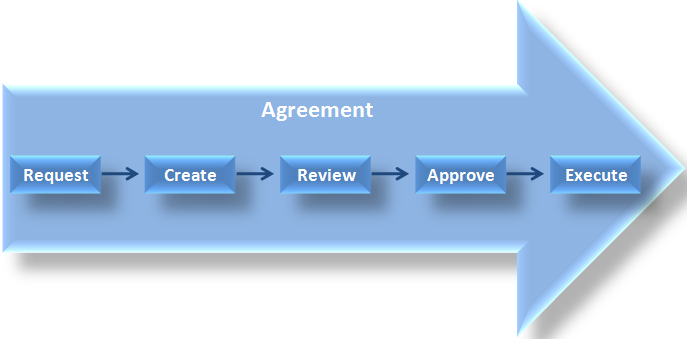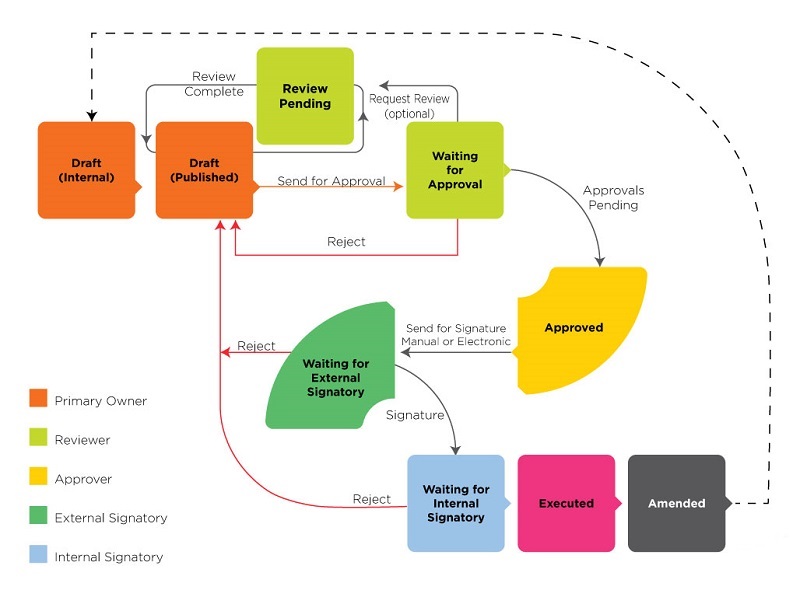| Line 15: | Line 15: | ||
| | ||
| − | [[File:ICM overview image.png]] | + | [[File:ICM overview image.png|RTENOTITLE]] |
'''1. Create contract request''': when someone in your organization, such as a department manager wants to engage a vendor for certain services over a length of time, the individual can raise that request with the procurement department that can then work on that agreement. Depending on the workflow adopted, your organization may: | '''1. Create contract request''': when someone in your organization, such as a department manager wants to engage a vendor for certain services over a length of time, the individual can raise that request with the procurement department that can then work on that agreement. Depending on the workflow adopted, your organization may: | ||
| Line 30: | Line 30: | ||
<br/> '''5. Add amendment''': if, after execution, there needs to be a change in the agreement, for example the payment terms or the scope of work (SOW) changes or terms and conditions (referred to as clauses in ICM) have to be changed because of the introduction of a new regulation, the primary owner can add an amendment. This process will be similar in nature, but a few things like the approvers may change. | <br/> '''5. Add amendment''': if, after execution, there needs to be a change in the agreement, for example the payment terms or the scope of work (SOW) changes or terms and conditions (referred to as clauses in ICM) have to be changed because of the introduction of a new regulation, the primary owner can add an amendment. This process will be similar in nature, but a few things like the approvers may change. | ||
| − | | + | This figure shows the different states of an agreement with various roles involved in creating it. |
| − | + | <div class="image-green-border">[[File:Agreement Workflow Role-Status white.jpg|Agreement Workflow]]</div> <div class="image-caption">Figure: Agreement workflow and various roles involved at different states of the agreement. </div> | |
| − | + | ||
| − | <div class="image-green-border">[[File:Agreement Workflow Role-Status white.jpg| | + | |
== == | == == | ||
Revision as of 05:54, 10 March 2017
Agreement Management
The Agreement Management Tile enables you to manage all aspects of creating and editing agreements from a single page. From here, you can:
- view and manage all your agreements on the Agreements Page.
- create new agreements on the Create Agreement Page.
- search, view and manage all your existing requests on the Requests Page.
- create new requests on the Create Request Page.
If you are new to the Icertis Contract Management (ICM) application, refer to the ICM Overview to get a better understanding of agreements and it's workflow in the context of this application. In ICM, the terms Agreement and Contract are used interchangeably and mean the same thing. In this Help, we will use the word Agreement when talking about Agreements. Contract will only be used in reference to Contract Types.
While the actual workflow of an agreement in ICM can be quite complex and involved, it is summarized in these 5 steps:
1. Create contract request: when someone in your organization, such as a department manager wants to engage a vendor for certain services over a length of time, the individual can raise that request with the procurement department that can then work on that agreement. Depending on the workflow adopted, your organization may:
- enforce this step so all contracts are initiated and drafted only by 1 department, or
- make this step completely optional, so it can be skipped by someone who is an expert at contracting and it's process.
2. Create agreement: this involves the primary owner (creator of the agreement) defining the contract type, selecting attributes and template, and verifying the details entered. See Create Agreement Page for complete details.
3. Review and approve agreement: once the primary owner has created an internal draft of the agreement, it gets published and this published draft can now be sent for reviews and approvals to the team of people that are working on this agreement in various roles.
4. Execute agreement: there can be one or more people that need to approve the agreement before it is ready to be signed. Once all approvals are obtained, the approved agreement can be sent to be signed by both the parties. With both parties signing (known as internal and external signatories in ICM), the agreement is said to be "executed" and is now in force.
* Primary Owner
* Secondary Owner
* Contributor
5. Add amendment: if, after execution, there needs to be a change in the agreement, for example the payment terms or the scope of work (SOW) changes or terms and conditions (referred to as clauses in ICM) have to be changed because of the introduction of a new regulation, the primary owner can add an amendment. This process will be similar in nature, but a few things like the approvers may change.
This figure shows the different states of an agreement with various roles involved in creating it.
Related Topics: Create Agreement | Create Request | Searching Agreements and Requests | Adding Supporting Documents to an Agreement | Setting auto-expiry for an Agreement

